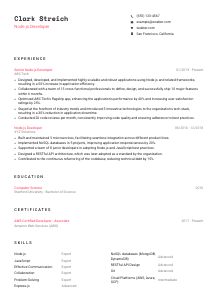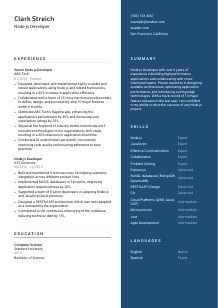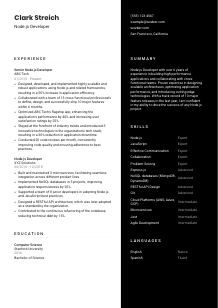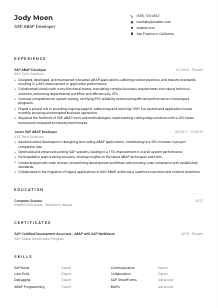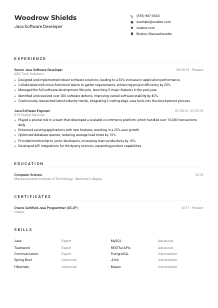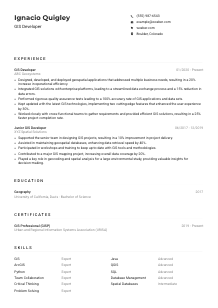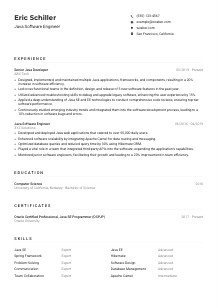Node.js Developer Resume Example
Building backends with Node.js, but your resume feels stuck in async mode? Explore this Node.js Developer resume example, optimized with Wozber free resume builder. Discover how effortlessly you can sync your server-side skills with job requirements, scripting a career that executes at warp speed!
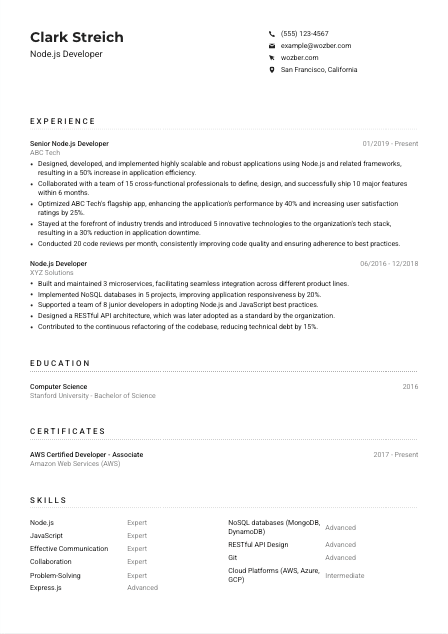
How to write a Node.js Developer Resume?
Hello, aspiring Node.js Developer! In a world where server-side savviness is the golden ticket, your resume isn't just paper—it's your code to unlocking career opportunities. Hovering over the compile button? With Wozber, you're about to write a resume that's not only a testament to your Node.js chops but also a masterclass in capturing the attention of hiring managers and breezing through ATS filters.
Are you ready to level-up your career? Let's turn your skills and experiences into a compelling ATS-compliant resume that opens doors!
Personal Details
"It's the small details that are vital. Little things make big things happen," once said a wise man. The same applies to your resume's personal details section. Let's tailor this crucial part of the puzzle to the Node.js Developer position.
1. Brand Yourself with Your Name
Think of your name as your personal brand's logo: it must be distinct and memorable. Opt for a clean, professional font that speaks 'Node.js Developer' without uttering a syllable. Make it slightly larger than the rest of the text for that lasting first impression.
2. Reflect the Node.js Developer Title
Right below your name, align your ambitions with clarity by stating 'Node.js Developer.' This small tweak instantly shows hiring managers you're in sync with the job requirements, making your resume more relevant at first glance.
3. Make Contact Details Count
List your most reliable contact number and a professional email address. A format like firstname.lastname@domain.com speaks volumes about your attention to detail—a trait every developer must nurture.
4. Showcase Your San Francisco Roots
Since the job's in San Francisco, CA, spotlight your local roots or your readiness to be there. Being in the same city as the job can tip the scales in your favor, making logistics a non-issue for your new employer.
5. Link to Your Professional Persona
In the tech universe, a LinkedIn profile or GitHub repository is your digital portfolio. Include a clean URL to guide hiring managers to samples of your work, further proving your prowess in Node.js development.
Takeaway
Approach your Personal Details as the 'npm init' of your resume; it's where you start defining what's to come. Each element is a placeholder for your professional identity. Make them count, setting a solid foundation for the narrative of your Node.js expertise.





Experience
The Experience section is where your resume starts compiling. It's where you demonstrate your command of Node.js, showcasing your contributions with precision. It's not just about what you've done; it's your chance to show how you think and solve problems like a seasoned Node.js Developer.
- Designed, developed, and implemented highly scalable and robust applications using Node.js and related frameworks, resulting in a 50% increase in application efficiency.
- Collaborated with a team of 15 cross‑functional professionals to define, design, and successfully ship 10 major features within 6 months.
- Optimized ABC Tech's flagship app, enhancing the application's performance by 40% and increasing user satisfaction ratings by 25%.
- Stayed at the forefront of industry trends and introduced 5 innovative technologies to the organization's tech stack, resulting in a 30% reduction in application downtime.
- Conducted 20 code reviews per month, consistently improving code quality and ensuring adherence to best practices.
- Built and maintained 3 microservices, facilitating seamless integration across different product lines.
- Implemented NoSQL databases in 5 projects, improving application responsiveness by 20%.
- Supported a team of 8 junior developers in adopting Node.js and JavaScript best practices.
- Designed a RESTful API architecture, which was later adopted as a standard by the organization.
- Contributed to the continuous refactoring of the codebase, reducing technical debt by 15%.
1. Filter and Highlight
Scan through your professional history and filter out the projects and roles that best align with the job requirements. Highlighting your work with Express.js or your contribution to building scalable microservices will show you're not just a match, but a catch.
2. Lay Out Your Professional Journey
Organize your experience in reverse chronological order, starting with your most recent position. Clearly list your job title—such as 'Senior Node.js Developer,' and the duration of your tenure, making it easy for the ATS to scan through your trajectory.
3. Dive Into the Details
For each role, chart out bullet points that mirror the job description. Did you boost performance by 40%? Or did you collaborate on shipping new features? These accomplishments, quantified by metrics, resonate with the needs outlined in the job posting.
4. Numbers Speak Louder
Quantify your achievements wherever possible. If your coding reduced server response times by a significant percentage, make that a headline. Numbers grab attention and make your contributions tangible.
5. Relevance Is Key
Keep your content focused. If you're a Node.js maestro, we don't need to know about that summer you spent as a barista (unless you automated their ordering system!). Tailor every bullet point to scream 'Node.js Developer.'
Takeaway
Think of your Experience section as a well-optimized function in your codebase. Each bullet point should execute flawlessly, showcasing your skills and impact. Align your achievements with the job requirements, and let your professional story persuade them that you're the one.
Education
In the world of Node.js development, where constant learning is part of the job, your Education section holds more weight than you might think. It's not just about where you went to school; it's about showing your commitment to mastering your craft.
1. Meet the Educational Baseline
If the job requires a "Bachelor's degree in Computer Science, Engineering, or a related field," that's your keyword-rich phrase to include. Ensure your degree aligns with these specifics to pass the ATS checks with flying colors.
2. Clear, Concise Structure
Keep this section easy to scan: Degree title, followed by the institution name, and your graduation year. An ATS-compliant resume sticks to simplicity for both human and machine readability.
3. Direct Match Is a Plus
If your degree precisely matches the job's requirements, spotlight it. For Node.js developers, a Computer Science degree is gold. This direct match can elevate your resume in the eyes of both the ATS and the hiring manager.
4. Coursework and Specializations
For budding Node.js Developers, listing key courses or projects can be a game-changer, especially if they're closely related to the job's skills. Did your thesis revolve around building a scalable app? Here's a good place to mention it.
5. Beyond the Degree
If you've participated in relevant extracurriculars, like coding clubs or tech meetups, or if you've taken additional courses that sharpen your Node.js skills, list them here. It paints a picture of a developer committed to growth.
Takeaway
The Education section is more than a formality; it's a testament to your foundational skills and ongoing commitment to learning. Tailor it to reflect the job requirements and position yourself as a candidate who not only meets but exceeds expectations.
Certificates
In the fast-evolving tech landscape, certificates are badges of honor that showcase your continuous commitment to growth. For a Node.js Developer, they signal proficiency and specialization. Let's curate this section to make it shine.
1. Identify Relevant Certifications
While the job description might not always spell out required certifications, aligning yours with the demands, like an AWS Certified Developer badge, instantly boosts your resume's relevance, especially when working with cloud platforms.
2. Quality Over Quantity
Choose to list certifications that speak directly to the skills listed in the job description. This approach ensures your resume remains clutter-free, highlighting only the credentials that matter most to the role.
3. Validity Dates Matter
Include the acquisition or expiry dates for time-sensitive certifications. This shows hiring managers you're up to date and serious about maintaining your qualifications in the ever-changing tech scene.
4. Never Stop Learning
The tech world waits for no one. Regularly updating your certifications and skills is crucial. Let this section reflect your journey of continuous learning, signaling to employers your drive to stay at the forefront of Node.js development.
Takeaway
Think of your Certificates section as the extra libraries and packages you import into your project—while not strictly necessary, they enhance functionality and demonstrate your capabilities. Select them wisely to add value to your 'application', showcasing your dedication to staying relevant and informed.
Skills
Your Skills section is where you compile your professional toolkit—a list that speaks volumes to hiring managers about your proficiency in Node.js and related technologies. Let's make this session run error-free, ensuring you're showcasing the in-demand skills that make you stand out.
1. Decode Essential Skills
Starting from the job description, identify both the hard and soft skills that align with your repertoire. Skills like "strong proficiency with JavaScript" and "familiarity with Microservices and Cloud Platforms" are your keywords for an ATS-optimized resume.
2. Match and Prioritize
Once you've listed your skills, prioritize them, starting with those most closely matching the job description. This not only passes ATS filters with ease but also makes it instantly clear to the hiring manager that you're a strong fit.
3. Clarity and Organization
Resist the temptation to list every skill under the sun. A cluttered skills section can dilute the impact of your truly relevant abilities. Organize them neatly, separating hard skills from soft skills, to ensure they're easy to scan.
Takeaway
The Skills section is your technical backbone, laying bare the tools you wield with confidence. Be strategic in selecting and arranging these skills, ensuring they align with the role's demands. This precision not only passes the ATS check but also positions you as the ideal candidate.
Languages
As a Node.js Developer, while your programming languages are paramount, your ability to communicate in human languages, especially in a diverse and global tech world, is a bonus. Let's articulate this section to reflect your linguistic capabilities, making you a versatile communicator.
1. Highlight Command of English
Given that "effective command of the English language is a must," list English at the top and rate your proficiency honestly. This aligns perfectly with the job requirement, making it one of the first checks for the hiring manager.
2. Showcase Additional Languages
Add any other languages you speak, which could prove advantageous in global teams or projects. Your proficiency in multiple languages can be viewed as an asset, showing you're capable of adapting and thriving in diverse environments.
3. Be Honest About Proficiency Levels
It's crucial to accurately represent your language skills. Using terms like 'Native,' 'Fluent,' or 'Intermediate' provides clarity on your level of proficiency, setting clear expectations for roles that might require specific language skills.
4. Consider the Role's Scope
For roles with a global or multicultural focus, emphasizing your language skills becomes even more crucial. It signifies your readiness and ability to communicate effectively in a world where tech knows no borders.
5. Continuous Improvement
Just like coding languages, human languages are about continuous learning. Whether taking courses or practicing with native speakers, show your commitment to improving your linguistic skills, mirroring your dedication to professional growth.
Takeaway
Your multifaceted language skills highlight your adaptability and readiness to engage in the global tech landscape. This section, though seemingly minor, underscores an invaluable asset in today's interconnected world. Whether in code or conversation, your ability to communicate effectively can set you apart.
Summary
Like the best opening function in a script, your Summary section should capture attention, setting the stage for what's to follow. It's where you encapsulate your Node.js expertise and the value you bring to the table, all while keeping it succinct and compelling.
1. Capture the Job's Essence
Kickstart your summary by addressing core requirements from the job description. As a Node.js Developer, focus on your experience with JavaScript and related frameworks, your problem-solving prowess, and how you've driven project success.
2. Lead with Your Professional Identity
Introduce yourself as a Node.js Developer who thrives in building scalable applications and optimizing performance. Highlight the years spent honing your craft, and don't shy away from dropping numbers to quantify your impact.
3. Address Key Achievements
Select a few definitive wins from your career—like improved application efficiency or successful mentorship of junior developers. This tangible evidence of your expertise and leadership skills directly reflects the job's demands.
4. Keep It Sharp
Your summary is the hook, not the handbook. Aim for a powerful 3-5 line pitch that encapsulates your qualifications and achievements without wandering into the weeds. Make every word count, targeting the Node.js Developer role with laser focus.
Takeaway
Your summary is your opening argument, the compelling case as to why you're the ideal candidate for the role. Tailoring it to the job's requirements sets the tone, affirming your fit and readiness to contribute from day one. Let this be the launchpad to your Node.js Developer journey.
Launching Your Node.js Developer Journey
Congratulations for meticulously crafting each section of your resume with Wozber's guidance. With a resume that resonates closely with the Node.js Developer position, you're now ready to submit your application with confidence. Remember, every detail in your resume is a step towards your next big opportunity. Keep learning, keep coding, and let your resume be the bridge to your dream job. The path is set, and the time is now. Deploy your career aspirations and watch them come to life!

- Bachelor's degree in Computer Science, Engineering, or a related field.
- Minimum of 3 years of professional experience in Node.js development.
- Strong proficiency with JavaScript and frameworks such as Express.js.
- Familiarity with Microservices, Cloud Platforms (AWS, Azure, or GCP), and NoSQL databases (MongoDB, DynamoDB).
- Effective communication, collaboration, and problem-solving skills.
- Effective command of the English language is a must.
- Must be located in San Francisco, CA.
- Design, develop, and implement scalable and robust applications using Node.js and related frameworks.
- Collaborate with cross-functional teams to define, design, and ship new features.
- Optimize applications for maximum performance and scalability.
- Stay up-to-date with industry trends and technologies to ensure the best possible solutions.
- Conduct code reviews, continuously refactor codebase, and mentor junior developers.





